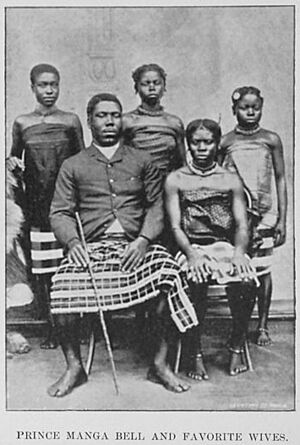Isithembu facts for kids
Isithembu is an African custom where a man can have more than one wife at the same time. This practice is also known as Sethepu in some areas. It is a long-standing tradition in many parts of Africa.
There are several reasons why a man might have more than one wife. For example, if his current wife or wives are unable to have children, he might marry another wife to help grow the family. In such cases, the first wife usually keeps her respected position as the senior wife. Sometimes, if a family wishes to have sons, a man might marry another wife. Also, if a wife prefers not to have children, another wife might be taken to ensure the family continues to grow. In some cultures, if a man passes away, his brother might marry his wives. This helps to make sure the family is looked after and stays together. For instance, in the Swazi culture, it is seen as normal for a man to have many wives, and for women to have children.
Contents
Understanding Isithembu: Simple Forms
Some African groups practice a simpler version of Isithembu. In this system, if a man marries one wife after another, they do not have special ranks or titles. Instead, they are simply known as the first wife, the second wife, and so on. This means one man is married to two or more women, but their roles in the family are generally equal in terms of position.
Understanding Isithembu: Complex Family Structures
Isithembu can also be very complex, especially in cultures like the Xhosa people and the Zulu people. In these systems, a man's wives and their children have specific positions within the family.
Xhosa Family Structures
Among the Xhosa people, when a man has two wives, his family is often divided into two main parts, sometimes called "estates."
- The first wife's household, which includes her children and other family members, is known as the "great house" (indlunkulu). This is usually the most important household.
- The second wife's household is called the "Right hand house" (ukunene).
If a man marries a third wife, she and her children become part of a "support house" (iqadi). This support house is connected to the great house. Sometimes, a third wife might have served the first wife before marriage. If there is a fourth wife, her household is also an iqadi, but it is connected to the right hand house.
Zulu Family Structures
The Zulu people also have a complex system for their family structures. A man's wives form distinct households:
- The "great house" (indlunkulu)
- The "right hand house" (iqadi)
- The "left hand house" (ikhohlwa)
If a man takes a fourth wife, her household is also called an iqadi. However, this fourth iqadi house might not have the same rights or standing as the other three main houses.


